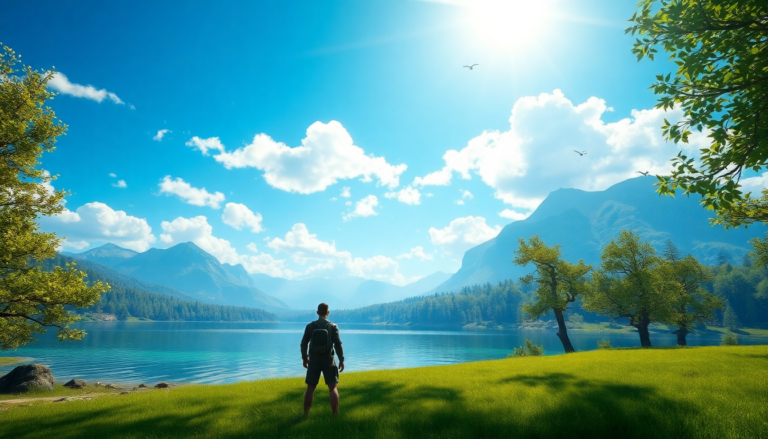Argomenti trattati
Open-world games are often celebrated for their expansive environments and the freedom they offer players. You know the feeling: you spot a distant mountain and think, ‘I can climb that!’ Or perhaps a menacing monster catches your eye, and you’re eager to engage. This freedom allows players to carve out their own adventures, often leading to personal quests that can be both entertaining and fulfilling. Yet, amid this exhilarating chaos, there’s a crucial element often overlooked: the ability to simply relax. Imagine a game where you can take a moment, sit on a bench, or perch on a rock, and just *breathe* within the game’s world. Sounds refreshing, doesn’t it?
Why relaxation matters in gaming
In the hustle and bustle of quests, battles, and exploration, it’s easy to forget that gaming can also be a form of escapism—a chance to unwind. I remember the days of playing titles like *Xenoblade Chronicles 2*, where uncovering hidden treasures was just as rewarding as the battles themselves. But what if the game also allowed you to pause and take in the breathtaking landscapes? What if you could sit on a rock and watch the sunset, just like in real life? This is what I think the ideal open-world game should embrace: a balance between action and tranquility.
Creating a space for players to unwind
Imagine a game where, after fulfilling a quest, you are not rushed to the next one. Instead, you can linger. You could sit on a park bench, lean against a tree, or even rest on a sleeping monster (who’d have thought, right?). In many current games, such as *GTA 6*, I hope to see this kind of idle interaction become more prevalent. The ability to roam at your leisure, perhaps even mimicking the NPCs around you, could transform the gaming experience into something more immersive and relatable.
In fact, that’s what makes games like *Red Dead Redemption 2* so memorable. There are moments where you can simply ride through the countryside, breathing in the atmosphere, enjoying the scenery, and feeling like you truly belong in that world. It’s not just about completing missions; it’s about living in the game’s universe.
Exploring the world without urgency
As many avid gamers can attest, the pressure of ‘completing’ a game often overshadows the simple joy of exploration. I remember a time when I was so engrossed in *Morrowind* that I forgot about the main quest entirely. I was simply wandering, discovering hidden areas, and getting lost in the lore. This is the kind of freedom I crave in games. The ability to just exist in a beautifully crafted world without the incessant pull of main storylines or side quests—what a treat that would be!
Games like *Breath of the Wild* capture this essence perfectly. The designers clearly understood that sometimes, players just want to take a break from the action to enjoy the environment. Whether it’s climbing a peak just to enjoy a panoramic view or soaking in a hot spring at night, these moments of downtime can be some of the most rewarding experiences in gaming. They remind us that it’s okay to slow down and appreciate the journey rather than just the destination.
Idle animations and player interactions
Another angle to consider is the use of idle animations. Imagine your character striking a pose or engaging in small talk with a nearby NPC while you take a breather in-game. Such features could add layers to character interactions and allow for more immersive storytelling. It’s those small moments that often leave a lasting impression. I think it would be fascinating if games could incorporate more of these interactions, letting players truly feel like they are part of the world around them.
In *Kingdom Come: Deliverance*, for instance, you can sit virtually anywhere. Imagine being able to chat with friends in-game while idly sipping a drink or playing a game of dice. These little interactions can make a world feel vibrant and alive, rather than just a backdrop for quests. Wouldn’t it be wonderful to see more games embrace this concept?
The future of open-world games
As we look to the future of gaming, there’s a growing demand for experiences that prioritize not just action, but *experience*. Games like *Persona 5* have made a name for themselves by allowing players to enjoy everyday life within a fantastical setting. As we move further into 2025, I genuinely hope developers recognize the potential for open-world games to include more downtime and relaxation options. In a world where everything is about speed and completion, taking a breather could be a revolutionary concept.
Ultimately, the best open-world games are those that invite us to explore, interact, and relax in their beautifully crafted environments. It’s time for developers to take a cue from nature itself: sometimes, slowing down can lead to the most rewarding experiences. So, the next time you find yourself in an open-world game, consider taking a moment to pause and simply *be*. You might just discover that it’s the quiet moments that make the loudest impressions.

